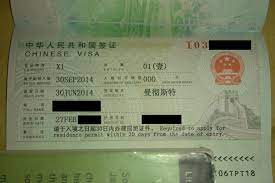
India-China Relations: Stapled Visa
India-China Relations: Stapled Visa
Mains Exam: General Studies Paper 2
(International Relations)
August 02, 2023
Context:
- There has been a dispute between India and China over the issuance of stapled visas to players from Arunachal Pradesh. Actually, the World University Games have started in Chengdu, China. India was also to participate in the Wushu (Martial Arts) competition in these games. For this, India was sending three players from Arunachal Pradesh, to whom China issued stapled visas. After this, India objected and decided not to send any player to the Wushu competition. Apart from the Arunachal Pradesh players, five other players, a coach and two assistants were also ordered not to travel to Chengdu. The Ministry of External Affairs termed China's decision to grant stapled visas unacceptable and the government has also strongly opposed the Chinese government in this matter.
What is Stapled Visa:
- When a visa is affixed on a separate paper instead of the visa stamp on the passport, it is called stapled visa. This type of visa is usually attached to the passport through staples. In fact, giving stapled visas to citizens of Arunachal Pradesh by China is part of Beijing's policy of not considering Arunachal as a part of India. China tells Arunachal Pradesh as its share and believes that because of this the people there do not need a visa to go to China. Also, China's policy also says that Arunachal residents are officially citizens of India, so they are required to be given stapled visas. Stapled visas are torn upon return.
- Thus there is no mark on the passport to provide proof that the person was granted a visa to that country. If China officially gives visas to the people of Arunachal, it fears that it will be taken as proof that it has accepted Arunachal as a part of India. Beijing has also given such stapled visas several times to the citizens of Jammu and Kashmir.
- This is not the first time that China has issued stapled visas to Indian nationals from Arunachal Pradesh. In the past, athletes from Arunachal Pradesh were also denied visas in China for international events such as the 2011 Asian Karate Championships and the 2011 Youth World Archery Championships. The Chinese government started issuing stapled visas to Indian nationals from Arunachal Pradesh in 2009.
Relationship at a Critical Juncture:
- The incident regarding the Chengdu Games comes at a time when efforts to stabilize relations between the two countries have been underlined. The Ministry of External Affairs said on July 27 that at the 2022 G20 summit in Bali, Indonesia, the leaders of the two countries discussed the need to stabilize bilateral relations. Prime Minister Narendra Modi and Chinese President Xi Jinping spoke to each other. Earlier on July 26, 2023, China's Foreign Ministry had said that the two leaders in Bali had reached an important consensus on stabilizing bilateral relations.
- According to the Ministry of External Affairs, India has always maintained that resolution of the entire issue requires resolution of the situation in the western sector of the India-China border along the Line of Actual Control and restoration of peace and tranquility in the border areas. The Government of India calls eastern Ladakh as the western sector, where in many places the armies of the two countries are deployed opposite each other since June 2020 till now. Recently National Security Advisor Ajit Doval met Chinese Foreign Minister Wang Yi in South Africa.
China claims:
- China claims 90 thousand square kilometers of land in Arunachal Pradesh. India believes that China has illegally occupied 38 thousand square kilometer area of Aksai Chin in the west. China refers to Arunachal Pradesh as Southern Tibet. The two countries share a 3,500 km (2,174 mi) long border. Till 1912 no clear boundary line was drawn between Tibet and India.
Ground Reality:
- India shares a 3,488 kilometer long border with China. This border passes through Jammu-Kashmir, Himachal Pradesh, Uttarakhand, Sikkim and Arunachal Pradesh. The China border is divided into three sectors – Western Sector i.e. Jammu and Kashmir, Central Sector i.e. Himachal Pradesh and Uttarakhand and Eastern Sector i.e. Sikkim and Arunachal Pradesh. There is no complete demarcation between the two countries till now. There are differences of opinion regarding several areas. India's Aksai Chin is currently under the control of China. During the 1962 war, China occupied this entire area. In the eastern sector, China claims Arunachal Pradesh as its own. China says that it is part of southern Tibet.
Way Forward:
- There should be no discrimination or preferential treatment on grounds of locality or color in respect of visas to Indian citizens holding valid Indian passports. Arunachal Pradesh is an integral state of India. This attitude of China should be strongly opposed.
- Instead of frustrating our sportspersons and every other Arunachal resident who wants a Chinese visa, we should start issuing stapled visas ourselves to anyone applying for an Indian visa from Tibet. We must also say that we will continue to do so until the disputed border between Tibet and India is resolved.
---------------------------------
Mains Exam Question
What is stapled visa? A dispute has arisen in India-China relations in the matter of stapled visas. Discuss.